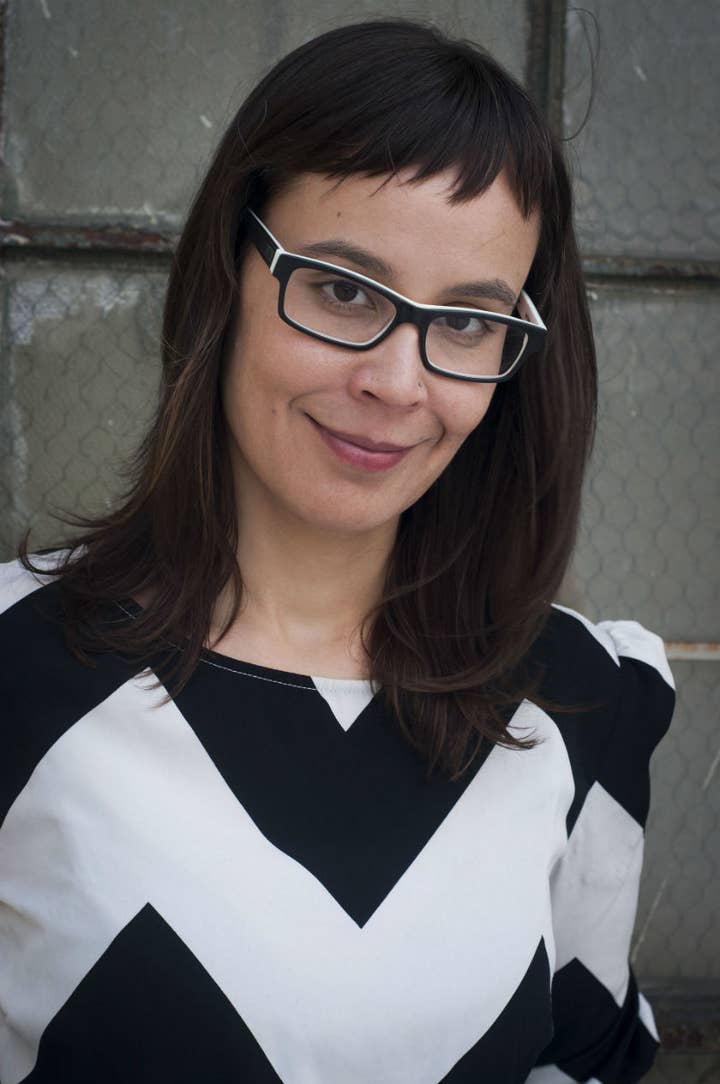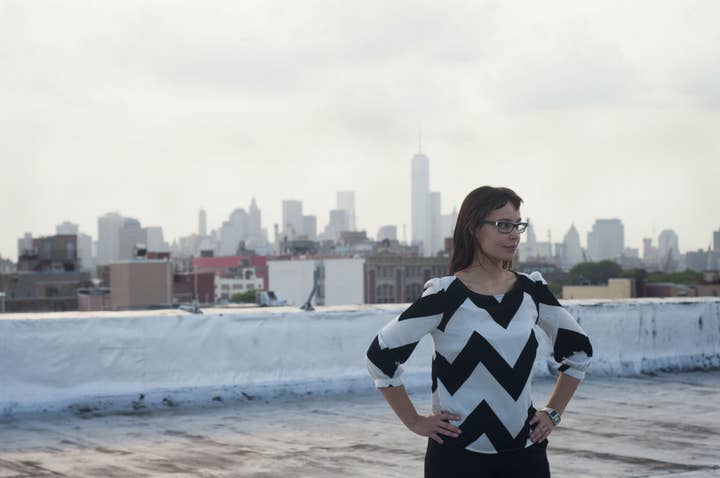"Companies really need to ask themselves if they're serious about diversity"
Code Liberation Foundation founder Phoenix Perry says more must be done to help women in the industry - far from being solved, the issue is "getting worse"
The percentage of women in the games industry sits at around 21, with a small bump in the figure coming from the transgender/androgynous/other* category provided by Statista. Even if every person in both categories identified as a woman, you'd be looking at just 26 per cent of the entire game development industry, in a world that's 50 per cent women, in an industry that's enjoyed 45 per cent by women.
Breaking the 21 per cent-or-thereabouts down into subcategories - game development is a wide, all-encompassing term after all - and you'll see something stark: 95 per cent of those working in programming are men, with just 5 per cent involved in coding being women. That's a huge gap, and it shows a real representation vacuum at the fundamental levels of game-making.
"It is pretty terrible," says Phoenix Perry, founder of Code Liberation Foundation, a non-profit organisation focused on helping women, girls, femme-identifying and non-binary individuals in and around the creative technologies and gaming industries. But with organisations like Perry's, Women In Games WIGJ and more, surely it's getting better? "No," Perry replies, "It's getting worse."
All the advocacy and awareness in the world, all the good-natured chat and genuine desire to be helpful people have - it's all been derailed in Perry's eyes by the "toxic garbage heap" that is Twitter and other social media platforms. "It's a toxic garbage heap that rewards abuse," Perry explains, when we meet at the Women in Games Europe conference. "And I feel like between Twitter and Instagram, and social media and a lot of these platforms, [it's] not only making it accessible for harassers to find women, [they're] making money off of it. We've got a really big problem.
"Women are less interested now in doing this than they were a few years ago because it's extremely dangerous"
"So women are less interested now in doing this than they were a few years ago because it's extremely, extremely dangerous."
Abuse on social media is a huge issue, but while platform holders are making steps to combat the problems there just isn't a giant amount of focus on the - relatively speaking - 'low importance' issue of basic abuse. "When you've got a 12-alarm dumpster fire over here," Perry says, "some women being called names over here is, like, a volume two level. [Volume 12] is like torture and murder and child pornography."
Basically, those moderating social media platforms have limited resources, and they have to be focused on the more pressing issues - illegal content, harmful content, dangerous content. Low level abuse doesn't get a look in on a day-to-day basis, so it continues, it has flourished, and it has not made public platforms a welcoming place to women.
But that's not the end of it. Nobody's packing up their bags and leaving for a life of solitude, embracing ignorance of the issues and hoping quietly things will just sort themselves out. No, Perry has ideas how change can be affected.
"It's time for us to stop asking for inclusion in tech," she explains, "Because women were 50 per cent of the industry, or really close to it. We were 47 per cent in the 80s, and it has long been something that women have done.

"We founded the field. We created nearly every single major advancement. We've been here. We created this. The question is not how do we get more women in, but how do we stop men from pushing those women out? The problem is institutional sexism, it's patriarchy, it's the way the engineering pipeline is deeply broken, in systemic and fundamental ways, that we cannot change without a systemic groundswell and shift about how women are treated in society."
That groundswell needs to come, Perry says, through a shift in attitudes. Young girls are interested in programming; it's just something that they're told isn't for them from a young age, a cultural aspect that hammers it home early on. "That sells them a bill of goods," Perry continues, "That says they should wear pink nail polish and buy pink skirts and have pink shoes, and be fluffy - excuse my French - fuckable dolls."
With the issue being one of society and culture, rather than a single industry, Perry says it's not something that will be changed by asking the question of how to get more women into STEM, or by any number of women's advocacy groups in the gaming and tech industries. "We have to raise the volume... to 'how do we stop what's going on in our culture?' Where women are being systematically harassed and abused across an array of fields. Not just academia, not just Hollywood, not just computer games, not just engineering. It's a huge, 360 issue."
Specifically focusing on the issue of women, coding and the games industry isn't easy to do when the problems arise from all corners. It's even harder when you feel a personal culpability for encouraging women into the space, as Perry explains: "I'm not sure what to do with it anymore. Gamergate gave me a real culpability for bringing women into this field. I watched the same women that I brought into this field have SWAT teams kick their mother's door down, and have crazy stalkers show up in person at their place of work.
"If the answer is to bring more women into code, but I can't safeguard their existence... is that an irresponsible move?"
"I mean, if the answer is to bring more women into code, but I can't safeguard their existence... is that an irresponsible move? I'm not necessarily sure the answer is no. That's highly irresponsible."
All the same, there are steps that can be taken to encourage more women into the space - like promoting women to management roles, paying them the same as their male counterparts, and offering family-based leave. "Discrimination in the hiring process needs to stop," Perry continues, "We should make sure that if we go to recruit for games jobs, and no women apply, we might stop and ask 'what did we do wrong?' There are definitely women developers out there, [so] why aren't they applying for these jobs?"
The steps Perry outlines go further. When women are hired and a sexual harassment or abuse complaint is raised, it needs to be dealt with in a satisfactory manner and not buried. "And it seems to me," Perry says, "that if a guy sexually harasses a woman, or sexually discriminates against her, there's really no way it doesn't punish the woman's career. I think that that needs to be dealt with. Companies need to develop policies that are smart and thoughtful, and don't punish the victim who complains."
Mentorship is another facet in the complex, imperfect solution Perry presents, as women are rarely offered much in the way of support and career-focused help from more senior members of the industry. And that need for support goes further, according to Perry, into help with mental health issues too. The games industry is exceptionally stressful for women working in it. If we remember back to the talk about social media, it's easy to see why that might be the case.
"Even just working all day and minor microaggressions that don't seem like such a big deal really stack up," Perry says, "And I think a lot of women internalise a lot of that abuse, and it comes out in productivity, and it comes out in illness, and it comes in just getting the flu one too many times."

If it sounds like a mentality borne of frustrating experience, that's because it is. Perry admits she's "the worst" for counting the number of women in the GDC catalogue, for example, always asking where the representation is coming from. "It's always terrible," she says. "I can usually count one." The need for women to be able to stand up front at these big events and show others they are there and it can be done - it's still important to do that.
"I think getting women who are developers who normally don't have the limelight on them [is a good approach]," Perry says. "We're used to looking at product people, we're used to looking to the streamers... That doesn't the help the 50 year-old who's just ground down and done work for 20 years and changed a field, who maybe doesn't need the press, but might need the encouragement.
"And I think you also get that of the nerdy girls, who may not look [like the streamers]. They may not fit into that mould, they might not look good on Twitch. Nobody wants to put them in an article, right? In my experience, the answer is no."
"I think that change is going to come with this younger generation. I think it's going to come with the millennials"
Basic, fundamental changes. More support on many levels. Re-framing the narrative around who we want to see and hear from in the games industry. None of it is simple, and all of it falls on a top-down approach to change. But this is just what Perry believes needs to happen to have a real impact, even going so far as government regulation on the hiring of women - making it more favourable to companies to do just that: "I think we could look at things like, if you hire x number of women, make it a tax incentive. Give them reason to do it, the government has to reward them for not just defaulting [to men]."
Looking at things from this sideways perspective is key to Perry's desire for change to happen. "If poor people are sicker than rich people, do poor people need better doctors? The answer is yes," she says, "Do they need better medical care than the rich? The answer is yes. If women are at risk for this kind of stuff, do they need more pay to deal with this? Do they need more support? The answer is yes.
"I think that companies really need to ask themselves if they're serious about diversity," Perry continues, "Because if so, go find some 18 year-olds and sponsor their college education. I run admittance for a games program which I've created at Goldsmiths University, and I see the applicants; it's a 50-50 [gender split] in the pool. I generally admit 50-50 students. I usually get 80-20 students, male-to-female. The reason for that is economic. The number of female students I have tell me 'if only there was money for me, I'd be there'. These companies need to invest at that kind of level."
Women are most likely to be working in art, and more often fall under the classification as freelancers according to the IGDA's developer satisfaction survey from 2017. Programming, coding, whatever aspect of the technical side of things you might want to focus on, not many women are involved in those disciplines.
And it's not going to change easily; it's going to take concerted effort from those with the power to make an impact. Advocacy and support groups will, but it's the giants of Silicon Valley, the publishers, the established development teams that will have to take the reins and force through change. There's still hope for the future of women and girls in coding, but for some like Perry that hope has been worn down to its rawest, most sensitive form.
"I think that change is going to come with this younger generation," she says, "I think it's going to come with the millennials. Not with the Gen X-ers, but these new kids coming up show all the promise in the world. If we have to wait till they get the power, I'm going to be a very old woman before I see change."
